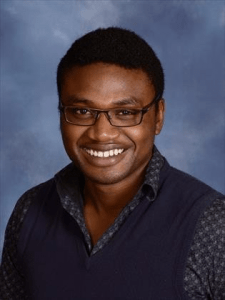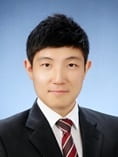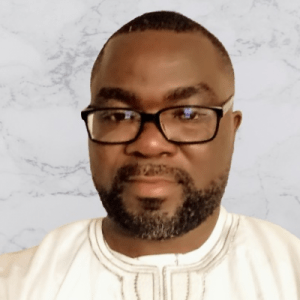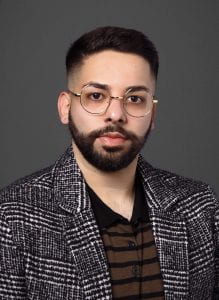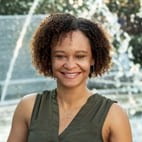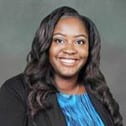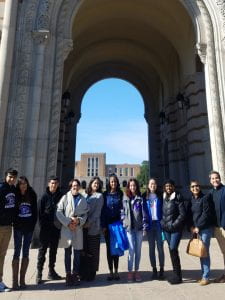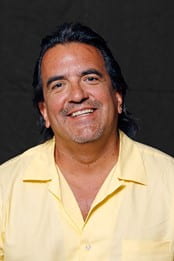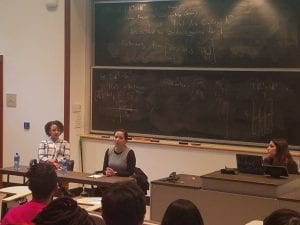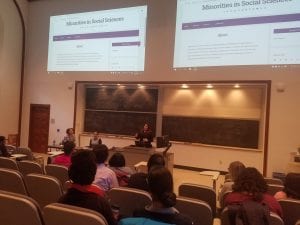MSS Visiting Speaker Series
Fall 2020 MSS invited and hosted some incredible scholars to present their timely and innovative research. This was an opportunity to highlight the great work of underrepresented junior scholars and engage with their work. Those who attended provided these young scholars with some constructive feedback.
“Feedback between training and practice in conceptualizations of phenotypic variation among medical trainees.” May 11th @ 2pm
Yesmar Oyarzun
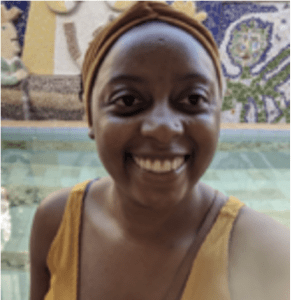
Yesmar Oyarzun is a fourth year PhD student in the Department of Anthropology at Rice University and a founding member of MSS. Yesmar will be presenting her National Science Foundation funded dissertation research, “Feedback between training and practice in conceptualizations of phenotypic variation among medical trainees.” This dissertation combines interview and archival methods to examine the relationship between skin color, dermatology, and race. First, this research examines how medical professionals deal with differences in skin color in their learning and practices. Second, it examines how emergent technologies shape understandings of phenotypic variation and the effects of such understandings on medical practice. Please join us in learning from one of our own and engaging with her important research.
“Need to Eat to Live : The interacting effects of food aids and UN peacekeeping on civilian victimization” February 24th @ 2pm central
Samaila Adelaiye, PhD
Samaila Adelaiye earned a Ph.D. in political science from the University at Buffalo. He has served as an adjunct professor in Political Science and International Relations at SUNY Geneseo and SUNY Buffalo State College.
Bong Joo Kim
Bong Joo Kim is a Ph.D. student at the University at Buffalo studying political science. His concentration is in Comparative Politics and International Relations, especially conflict studies.
Research has shown that food insecurity is linked to civilian victimization by armed groups. Considering the role of food as a resource and its relation to the propensity towards civilians’ victimization in times of armed conflict, an examination of how food interventions could mitigate this relationship is essential. Our paper looks at the role that food interventions could play in conflict dynamics; we analyze how peacekeeping forces coupled with food aid provision can reduce the opportunities for civilian victimization. Using data on peacekeeping operations and food aid in conflict zones, we show that together, these forces interact to reduce wartime victimization of civilians.
_______________________________________________________
“Climate Shocks, Land Rights and Farmer-Herder Conflict Dynamics in Ghana.” March 15th @ 1:30pm central
Daniel K. Banini
Daniel Banini is a Ph.D. candidate at the School of Politics, Security and International Affairs, University of Central Florida.
The climate-conflict nexus debate has received much scholarly attention within the political science literature, with research producing inconsistent findings. The empirical work generates three outcomes: a) that climate change has a causal or correlational effect on violent conflict, b) climate extreme does not affect violent conflict, and that c) the climate-conflict link must consider other meditating mechanisms that hardly receive scholarly. There is near unanimity among conflict scholars regarding the reality of climate change. Nonetheless, contention remains about its deleterious effect on conflict, and more importantly, the kind of conflict associated with climatic shocks. This project introduces a more appropriate categorization of conflict linked to environmental shocks: farmer-herder contentions over resources (arable land, water, and grazing routes) in Ghana. First, it theorizes farmer-herder tensions as emergent of climate volatility, arguing it induces environmental scarcity, making it difficult for both groups to sustain their operations, a situation that leads to conflict. Second, it evaluates how common-pool resource (CPR) governance regimes and institutions contribute to the conflict process. The CPR component of the research considers the social embeddedness of shared-use resources and the implications of different user stratifications to explain the confrontations. The analysis draws on detailed interview data gathered in the conflict hotspots in Ghana in 2020. The findings indicate that a) climate shock has a deleterious effect on farmer-herder conflicts, with the intensity (frequency and fatality) peaking during the heart of the drought period, and b) ambiguous CPR governance regimes and weak land rights feature also prominently as the conflict driver.
_______________________________________________________
“Cultural Inertia: Framework of change and intergroup relations”
November 5th 5:00 P.M. Central – Angel Armenta: Angel is a PhD student at the University of Texas El Paso studying Social Psychology.
The process of globalization continues to introduce new ideas, beliefs, and values to cities, states, and countries through increased social interaction. More broadly, globalization has introduced cultural change, which is theorized to generate intergroup hostility. In this talk, we will discuss the utility of the Cultural Inertia Model as a tool for testing the effects that change (or lack thereof) may have on intergroup relations.
_______________________________________________________
“Relating on a College Football Team”
November 12th 5:00 P.M. Central– Tracie Canada: Dr. Tracie Canada is a Postdoctoral Research Associate at University of Notre Dame. Her research has been supported by various agencies, including the Mellon Mays Undergraduate Fellowship.
Arguably the national sport, American football is a standardized space that, ideally, disciplines and trains bodies, serves as a vehicle in the transmission of cultural values, and mirrors a modernist preoccupation with order. One of the most recognizable ways this is done is through the idea of the team, a narrative that is touted by football administrators and popularized in the media to demonstrate how players are able to come together as a ‘football family’ for the greater good of the overall unit. However, this paper borrows from Eduardo Bonilla-Silva’s notion of a racial grammar that shapes everyday life to complicate this trope. I argue that the notion of the team projects onto college players’ lives normative, Euro-American standards of whiteness because of its dependence on rationality, order, specialization, and surprisingly, cellular individuality. Because of this, it is important to consider how Black players navigate this administration-driven family ordering. By focusing on the lived experiences of Black college football players at predominantly white institutions in the southeastern U.S., I consider how these athletes confront this circumstance with their own forms of relatedness that, at times, contradict and undermine the idea of the team.
_______________________________________________________
“The Poor, The Partisan, and The Diverse: How do Political Institutions and Racial Diversity Affect Welfare Generosity in the American States?”
November 21st 5:00 P.M. Central – Naomi Nubin: Naomi is a PhD candidate in Political Science at the University of Houston.
Many scholars have produced insightful research regarding the influence of state level characteristics on social policy outcomes in the American context. Political institutions and social diversity are two of the major contributors of these state level outcomes. Social diversity has been identified to be correlated with various forms of inequality as well as a number of other policy related outcomes. This paper examines social diversity in two ways; the traditional sense using state level measures of the Blau index and incorporates a new perspective of social diversity through a lense of immigration by using the proportion of foreign-born populations. But, what has been less explored is how state level political institutions, in this case; governor’s party identification, citizen ideology, and legislative composition influence welfare generosity. Using the Temporary Assistance for Needy Families’ program (TANF), and an originally collected panel data set from 1999-2016, this project explores how benefit generosity (welfare cash benefits) is influenced by state political institutions, as well as social diversity. My findings suggest that in most cases, the level of social diversity in a state reinforces these relationships. This research further uncovers the interplay between state-level political institutions, social diversity, and welfare generosity
MSS x BGSA Grant Writing Workshop
MSS Hosts Northside High School Students
On October 31, 2019, students from Minorities in Social Sciences hosted students from Northside High School in Houston on a visit to Rice University. Students were able to learn about what it means to have a career in the social sciences from graduate students and from professors in the School of Social Sciences. Their visit included running an experiment in Dr. Rick Wilson’s lab, lunch with students from MSS, and faculty presentations about the work that they do as social scientists in various disciplines.
MSS Scholar Spotlight: Dr. Michael Zárate
On September 27, 2019, Dr. Michael Zárate presented his work on the social cognitive processes that underlie person and group perception. In his talk titled “Cultural Inertia – How the Desire to Remain Stable Produces Prejudice,” he showed how those processes lead to prejudice and stereotyping.
Dr. Zárate is a Professor of Psychology at the University of Texas at El Paso and the Program Director of Social Psychology at the National Science Foundation. After the lecture, students had the opportunity to sit down with Dr. Zárate and learn more about his work and his experience in the academy at a happy hour sponsored by the School of Social Sciences.
MSS x BGSA Happy Hour
Diversity in the International Studies Profession
The Minorities in Social Sciences Group (MSS) presented Dr. Brett Ashley Leeds, Professor and Chair of Rice University’s Department of Political Science, President of Peace Science Society, Founder of Women in Conflict Studies, and former President of the International Studies Association for a keynote address about Diversity in International Studies. The talk was based on both research and Dr. Leeds’s personal experience as a woman in a predominantly male field. It focused on understanding the impact of increasing women’s representation in the field of international studies, the barriers that women face within the profession, and steps we might take to ease these barriers. Dr. Leeds also discussed what recent increases in gender diversity in International Studies can tell us about the importance of increasing racial and ethnic diversity in the field.
Date: Friday, April 12th
Time: 5:00 – 6:00PM
Location: HUM – 117
The event was followed by a reception in HUM Courtyard.
* We thank Dr. Leeds for her talk and GPS for their support.
